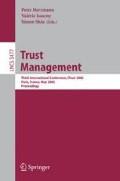Abstract
This paper reviews trust from both a social and technological perspective and proposes a distinction between persistent and dynamic trust. Furthermore, this analysis is applied within the context of trusted computing technology.
Access this chapter
Tax calculation will be finalised at checkout
Purchases are for personal use only
Preview
Unable to display preview. Download preview PDF.
References
ACM, Special Issue on Trusting Technology. Communications of the ACM 43(12) (December 2000)
Anderson, R.: Trusted Computing’ Frequently Asked Questions, v1.1 (August 2003), Available via http://www.cl.cam.ac.uk/~rja14
Blaze, M., Ioannidid, J., Keromytis, A.D.: Experience with the KeyNote Trust Management System: Applications and Future Directions. In: Nixon, P., Terzis, S. (eds.) iTrust 2003. LNCS, vol. 2692, pp. 284–300. Springer, Heidelberg (2003)
Castelfranchi, C., Tan, Y.-H. (eds.): Trust and Deception in Virtual Societies. Kluwer Academic Publishers, Dordrecht (2001)
Cheskin: Research and Studio Archetype. eCommerce Trust Study, University College London (January 1999), Available via http://www.sapient.com/cheskin/
Egger, F.N.: Increasing Consumers’ Confidence in Electronic Commerce through Human Factors Engineering, MSc project, University College London (1998)
Friedman, B., Kahn Jr., P.H., Howe, D.C.: Trust Online. Communications of the ACM 43(12), 34–40 (2000)
Giff, S.: The Influence of Metaphor, Smart Cards and Interface Dialogue on Trust in eCommerce, MSc project, University College London (2000)
Grandison, T., Sloman, M.: Trust Management Tools for Internet Applications. In: Nixon, P., Terzis, S. (eds.) iTrust 2003. LNCS, vol. 2692, pp. 91–107. Springer, Heidelberg (2003)
Intel, LaGrande Technology Architectural Overview (September 2003), Available via http://www.intel.com/technology/security/downloads/LT_Arch_Overview.pdf
ISO/IEC 15408 (all parts), Information technology – Open Systems Interconnection – Evaluation criteria for information technology security, International Organization for Standardization, Geneva, Switzerland (1999)
Jupiter, Trust Online: Barrier Today, Strength Tomorrow, Research Report, April 4 (2001)
Kumar, N.: The Power of Trust in Manufacturer-Retailer Relationships. Harvard Business Review, 92–106 (November-December 1996)
Luhmann, N.: Trust as a Reduction of Complexity, Trust and Power: Two works by Niklas Luhmann, pp. 24–31. John Wiley & Sons, New York (1979)
Microsoft, Next-Generation Secure Computing Base home page, http://www.microsoft.com/resources/ngscb
Nielsen, J.: Trust or Bust: Communicating Trustworthiness in Web Design. Jacob Nielsen’s Alertbox (1999), Available via http://www.useit.com/alertbox/990307.html
Nissenbaum, H.: Can Trust be Secured Online? A theoretical perspective. Etica e Politica 2 (December 1999)
Osterwalder, D.: Trust Through Evaluation and Certification? Social Science Computer Review 19(1), 32–46 (2001)
Pearson, S.: A Trusted Method for Self-profiling in e-Commerce. In: Falcone, R., Barber, S.K., Korba, L., Singh, M.P. (eds.) AAMAS 2002. LNCS (LNAI), vol. 2631, pp. 177–193. Springer, Heidelberg (2003)
Pearson, S.: Trusted Computing: Strengths, Weaknesses and Further Opportunities for Enhancing Privacy. In: Herrmann, P., Issarny, V., Shiu, S.C.K. (eds.) iTrust 2005. LNCS, vol. 3477, pp. 305–320. Springer, Heidelberg (2005)
PRIME: Privacy and Identity Management for Europe, European RTD Integrated Project under the FP6/IST Programme (2004), http://www.prime-project.eu.org/
Rousseau, D., Sitkin, S., Burt, R., Camerer, C.: Not so Different after All: a Cross-discipline View of Trust. Academy of Management Review 23(3), 393–404 (1998)
Simmel, G.: Soziologie, 5th edn., Berlin, p. 263 (1968)
Trusted Computing Group, TCG Main Specification, Version 1.1b (2003), Available via http://www.trustedcomputinggroup.org
Trusted Computing Group, TCG Specification Architecture Overview, Version 1.2 (2004), Available via http://www.trustedcomputinggroup.org
Trusted Computing Group, TCG TPM Specification, Version 1.2 (2003), Available via http://www.trustedcomputinggroup.org
Yan, Z., Cofta, P.: A mechanism for trust sustainability among trusted computing platforms. In: Katsikas, S.K., López, J., Pernul, G. (eds.) TrustBus 2004. LNCS, vol. 3184, pp. 11–19. Springer, Heidelberg (2004)
Yung, M.: Trusted computing platforms: The good, the bad, and the ugly. In: Wright, R.N. (ed.) FC 2003. LNCS, vol. 2742, pp. 250–254. Springer, Heidelberg (2003)
Author information
Authors and Affiliations
Editor information
Editors and Affiliations
Rights and permissions
Copyright information
© 2005 Springer-Verlag Berlin Heidelberg
About this paper
Cite this paper
Pearson, S., Mont, M.C., Crane, S. (2005). Persistent and Dynamic Trust: Analysis and the Related Impact of Trusted Platforms. In: Herrmann, P., Issarny, V., Shiu, S. (eds) Trust Management. iTrust 2005. Lecture Notes in Computer Science, vol 3477. Springer, Berlin, Heidelberg. https://doi.org/10.1007/11429760_24
Download citation
DOI: https://doi.org/10.1007/11429760_24
Publisher Name: Springer, Berlin, Heidelberg
Print ISBN: 978-3-540-26042-4
Online ISBN: 978-3-540-32040-1
eBook Packages: Computer ScienceComputer Science (R0)

